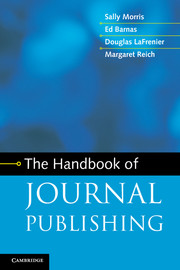Book contents
- Frontmatter
- Contents
- Preface and acknowledgments
- 1 Introduction to journals
- 2 Managing journals
- 3 Editing
- 4 The production process
- 5 Journal metrics
- 6 Marketing and sales
- 7 Fulfillment
- 8 Journal finances
- 9 Subsidiary income
- 10 Contract publishing
- 11 Copyright and other legal aspects
- 12 Ethical issues
- 13 The future of scholarly communication
- Appendix 1 Glossary
- Appendix 2 Resources
- Appendix 3 Vendors
- Index
- References
8 - Journal finances
Published online by Cambridge University Press: 05 March 2013
- Frontmatter
- Contents
- Preface and acknowledgments
- 1 Introduction to journals
- 2 Managing journals
- 3 Editing
- 4 The production process
- 5 Journal metrics
- 6 Marketing and sales
- 7 Fulfillment
- 8 Journal finances
- 9 Subsidiary income
- 10 Contract publishing
- 11 Copyright and other legal aspects
- 12 Ethical issues
- 13 The future of scholarly communication
- Appendix 1 Glossary
- Appendix 2 Resources
- Appendix 3 Vendors
- Index
- References
Summary
“My other piece of advice, Copperfield”, said Mr Micawber, “you know. Annual income twenty pounds, annual expenditure nineteen pounds nineteen and six, result happiness. Annual income twenty pounds, annual expenditure twenty pounds ought and six, result misery.”
(Dickens, 1849)Introduction
No matter how well edited a journal is, how many subscribers/readers it has, or how high its impact, a journal cannot continue to exist unless the income it derives covers all of its expenses. Not only that, but a sufficient surplus of income over expenses must be generated if a journal (or a list of journals) is to survive in the long run. A surplus is needed to cover the inevitable discrepancies between financial projections and actual results, to provide seed money for future projects, and to build a reserve to weather downturns. In addition, learned society publishers need surpluses to fund their other activities, and university presses to support loss-making but nevertheless worthwhile publications; commercial publishers need to generate a sufficient return on investment to keep investors happy. In the current online environment, a surplus is even more necessary in order to cover both continuous product development and the need to convert content as new standards of online presentation and delivery develop. With a surplus of just one eighth of 1%, Mr Micawber was operating on a very thin margin.
- Type
- Chapter
- Information
- The Handbook of Journal Publishing , pp. 220 - 269Publisher: Cambridge University PressPrint publication year: 2013



